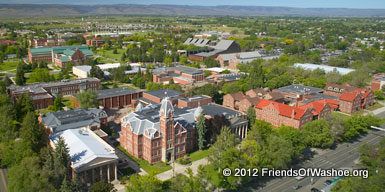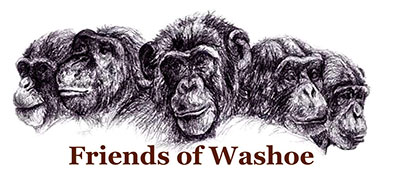September, 1980: Washoe, Loulis & Moja and the Fouts Family Move to Central Washington University

Adapted from Chapter 10 of Next of Kin, by Roger Fouts with Stephen Tukel Mills (pp. 253-257).
... It was time to find a better home for the chimpanzees. But where? In early 1980, I spoke at universities in California, Texas, Ohio, North Dakota, Oregon, Michigan, Tennessee, Colorado, and Manitoba. Everywhere I went I looked for primate facilities and possible sanctuaries. I began talks with one or two schools, but it was slow going.
Then a door opened in the least likely of places. In May 1980 I spoke at Central Washington University (CWU) in Ellensburg, Washington, but I gave no thought to any job prospects there. Central Washington awarded bachelor's and master's degrees only, no doctorates. They wouldn't have much interest in a professor who taught advanced courses in primate behavior and communication.
But CWU officials became very persistent. They remembered that during some years in the mid-1970s Washoe had gotten more national media attention than the University of Oklahoma football team, and football in Oklahoma is something akin to a state religion. The next day I received surprising news that CWU did have a primate facility, and it was almost new. The third floor of the recently built psychology building had a wing with four rooms designed to house monkeys, but no one was working with monkeys. I went to have a look at the rooms.
They had excellent trench drains, individual heat and humidity controls, floor-to-ceiling windows (in one room), and, luxury of all luxuries, a kitchen! (Cooking for three chimpanzees is a full-time job.) Compared with our cockroach-infested, windowless firetrap at South Base, the monkey wing looked palatial.
I hadn't formally been offered a job yet, but when I got back to Oklahoma I found myself making the case to Debbi for moving to Central Washington. Ellensburg is a charming small town nestled in a beautiful valley on the eastern slopes of the Cascade Mountains, about two hours east of Seattle. We agreed that it would be an improvement for the chimpanzees and a good place for our kids to grow up.
The drawbacks were just as clear. Compared with Oklahoma, whose psychology department was ranked a respectable thirteenth in the nation, CWU was an academic backwater. Unlike the University of Washington at Seattle, CWU was not a major magnet for federal funding. I would not have Ph.D. students to assist and advance my work. And Debbi would have to give up her lifelong dream of getting her own doctorate.
These were all significant sacrifices. But deep in our hearts, Debbi and I both felt that CWU offered us the freedom to create the best possible environment for Washoe's family. In fact, CWU being a backwater was one of its greatest attributes. It had no established primate protocols, no technocrats, guards, guns, or rules. It was a blank slate. We would finally be free to create a chimpanzee research setting based on mutual respect and compassion, instead of fear and domination. Obviously I would have preferred a large sanctuary where the chimpanzees could spend most of their time outdoors, but the president of CWU was encouraging about the possibility of building an outdoor facility in the near future. In the meantime, my priority had to be getting Washoe, Loulis, and Moja into a safer and more comfortable home.
In June 1980 I accepted a tenured position as Professor of Psychology at Central Washington University. The dean of Oklahoma's graduate school was aghast when I told him the news. "Where?" he kept saying, as if he hadn't heard me the first time. After urging me to stay, he promised that Oklahoma would build me a proper facility in a year or two. If they didn't, he added, I would certainly get offered a position at an Ivy League school. He still didn't seem to get it. In the previous year I had visited a dozen university-affiliated primate labs. I'd seen firsthand how they treated nonhuman primates, and I wanted no part of it.
I was almost expecting Lemmon to spring some last-minute surprise on us, so I kept our moving plans under close wraps. I quietly made arrangements to borrow a double-long horse trailer from a student who worked for an animal training facility near Los Angeles. Other than six graduate students, no one affiliated with the university or the Institute knew how or when we were leaving. I recruited two of my students to help me transport the chimpanzees to Ellensburg.
One morning before dawn in late August, I backed up the trailer to our South Base barracks. The trailer was certainly big enough to hold two chimpanzee cages, with Washoe and Loulis sharing one cage and Moja in the other. I would ride alongside them in the trailer while one of my students drove the truck. But persuading Washoe and Moja to get into the cages was even tougher than I had expected. Both of them loved car rides, but they could tell by the strange trailer and my shameful begging that this was more than a ride around the block. The more I offered them-soda, candy, yogurt-the more suspicious they grew. I was stuck. I couldn't muscle them in, because they were stronger than me. I could anesthetize them, but that would require a "capture gun" that shoots a thick dart, tipped by a needle, that actually opens a wound and can be quite painful.
Finally I just flat-out lied to Moja. YOU ME GO HOME, I signed to her, meaning that I was taking her to Reno. Her eyes lit up and she bounded into the trailer. Washoe was tougher. I told her we were moving to a new home and a better place, but she wouldn't go farther than the back ledge of the trailer. She reached into the cage and cleaned out the goodies inside, holding the trailer door open so I couldn't close it behind her. Next I tried yelling and intimidating. But in the end I had to threaten her by taking out the capture gun. Washoe screamed and climbed into the cage, with Loulis right behind her.
She sat in the back corner of her cage, mad as hell that I had forced her in. Two hours later, when we stopped at the first gas station, she still wouldn't look at me through the side door of the trailer. But when I came back from the convenience store with ice cream, her whole attitude toward our road trip changed. HURRY, HURRY, GO, GO, she signed, pointing down the road. Suddenly she was an enthusiastic traveler, and every two hours we had to stop for gas and ice cream.
The trip gave me plenty of time to reflect on the life we were leaving. The moment we pulled out of South Base I breathed a long sigh of relief. Ever since Sequoyah's death I had become so fearful for the chimpanzees that all I could think about was getting Washoe, Loulis, and Moja out of Oklahoma alive. Now they were beyond Lemmon's reach, and I was almost gleeful.
My elation was quickly tempered by thoughts of those we had left behind. I had a terrible feeling about what would happen next. Lemmon might finally lure some biomedical researchers to the Institute, or maybe he would auction off the chimps to a lab. Either way, I had trouble imagining a happy ending for Ally, Booee, Bruno, Cindy, Thelma, Manny, and all the others.
... I turned my attention back to the road, to the three chimpanzees in the trailer with me, and to the van ahead of me carrying Debbi and our three children. It seemed hard to believe that just a decade earlier, when I got off that plane in Oklahoma, Washoe was the only chimpanzee I knew. In the years since then Washoe's chimpanzee family and my human family had become kin. But now as we headed toward an unknown future and a hoped for sanctuary, I felt a terrible sense of loss. I knew in my heart that no matter how wonderful a home we would build in the years to come, it would always feel incomplete. As long as Ally and the rest of my extended family were locked away, I could never be at peace.
Fouts, R. & Mills, S. T. (1997). Next of Kin: My Conversations with Chimpanzees. New York: HarperCollins.

